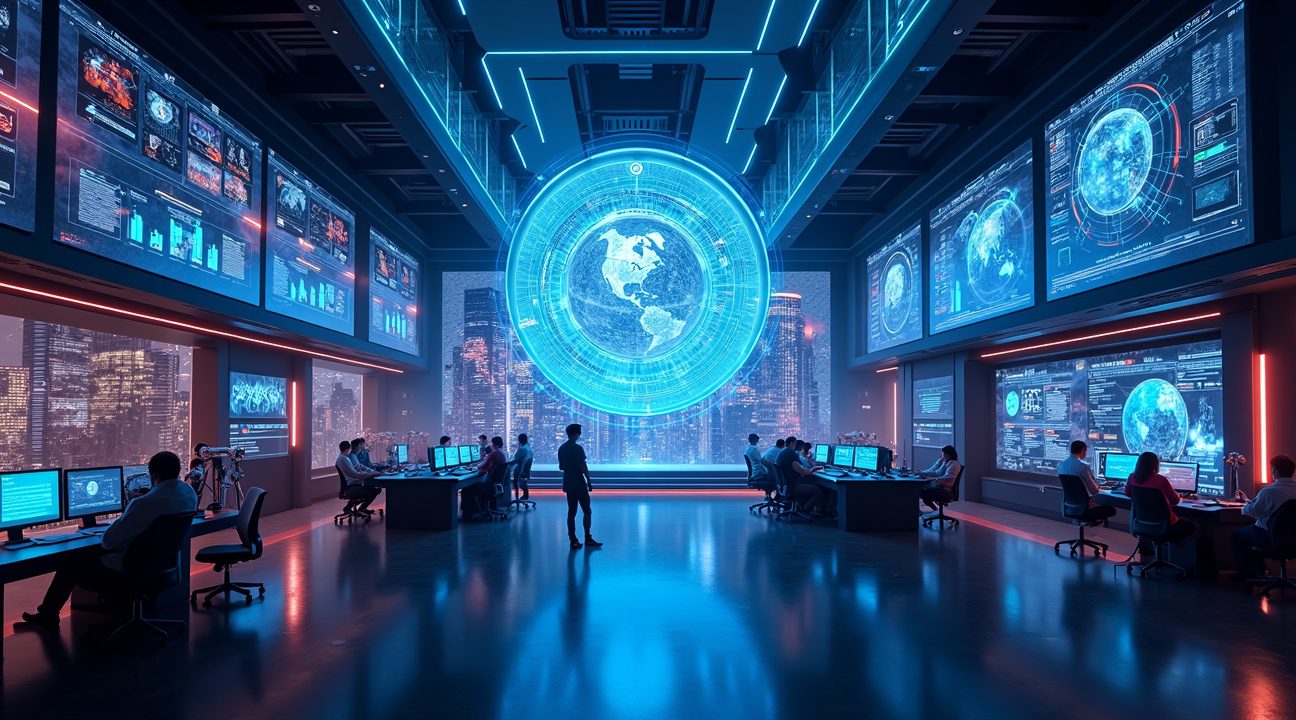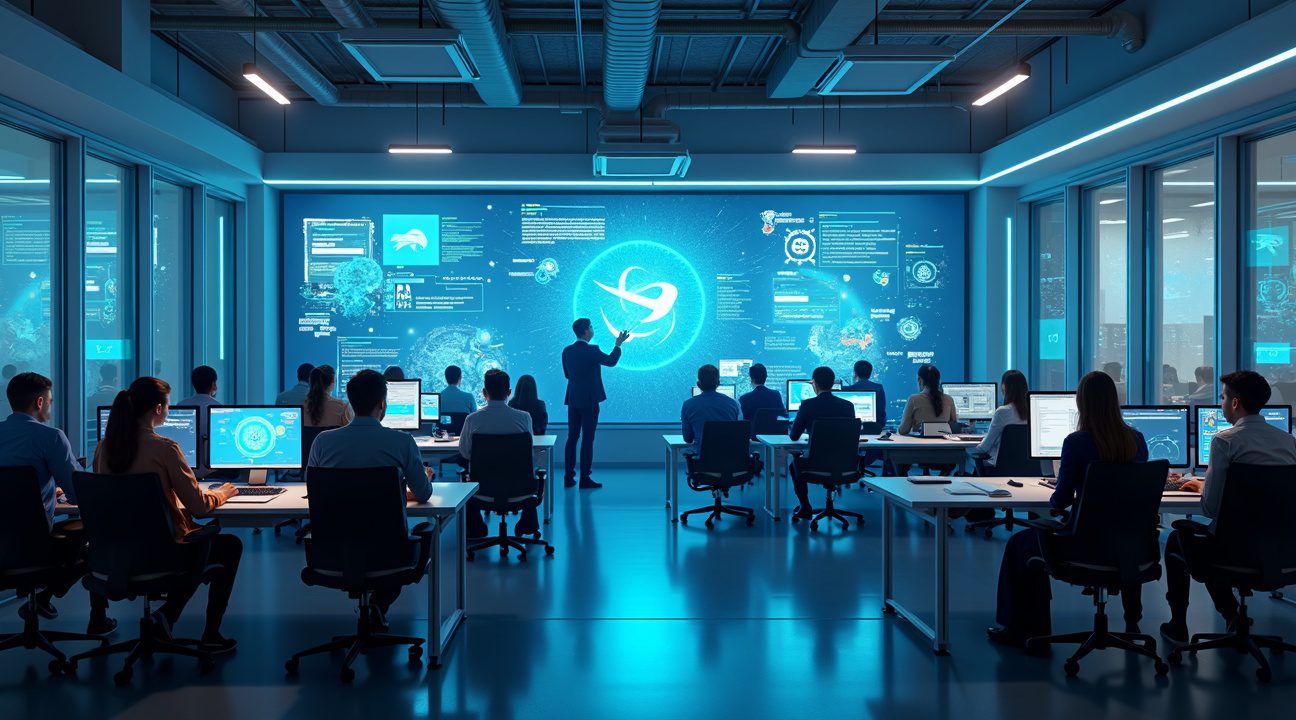Krafton, the acclaimed publisher best known for PUBG, has embarked on a $70 million transformation to become an “AI-first” company, a move that includes launching a voluntary resignation program for employees who may not wish to enter the AI-driven future of work.
Key Takeaways
- Krafton is investing $70 million to transform into an AI-first company, with plans to complete AI integration across all operations by the second half of 2026.
- A voluntary resignation program has been introduced, offering employees the option to leave as AI-driven workflows become central to the company’s operations.
- Beginning in 2026, the company will allocate $21 million annually to employee support programs aimed at facilitating successful human-AI collaboration.
- The transformation will focus on “Agentic AI” systems, capable of setting goals, creating strategies, and executing complex tasks autonomously.
- Krafton’s strategic direction aligns with industry trends, as global AI expenditure is projected to reach $375 billion in 2025, with a potential rise to $500 billion by 2026.
A Major Industry-Leading Pivot
This ambitious shift positions Krafton at the forefront of AI integration within the gaming industry. As artificial intelligence reshapes modern business operations, Krafton’s move could serve as a model for other publishers facing similar pressures to innovate or fall behind.
The introduction of a voluntary resignation option suggests the company is aware of the difficulty some employees may face adapting to an increasingly automated environment. For those choosing to remain, Krafton promises robust retraining and support initiatives.
Implementation Timeline and Efficiency Goals
The AI transition will be rolled out over three years, from 2024 to 2026. During this period, Krafton anticipates achieving 40% to 60% gains in operational efficiency. Productivity metrics will evolve to highlight team performance and effective collaboration with AI systems rather than traditional individual output.
“Agentic AI” Shaping the Future
The centerpiece of this transformation is Krafton’s planned deployment of “Agentic AI”—a type of artificial intelligence capable of independently analyzing problems, making decisions, and executing solutions. This innovation will dramatically change areas such as:
- Game development—streamlining design, storyline creation, and asset generation.
- Quality assurance—automating testing cycles with minimal human input.
- Customer service—delivering personalized player support using intelligent bots.
Industry Implications and Market Reaction
Industry analysts are closely watching Krafton’s transformation. If successful, it may accelerate AI adoption across the gaming sector. Conversely, if challenges arise, it could encourage competitors to take more cautious approaches.
Market response has been encouraging—Krafton’s stock surged 12% following the announcement, indicating investor optimism. However, long-term success will hinge on effective execution and maintaining workforce confidence during this period of rapid change.
Balancing Automation With Creativity
Traditionally, the gaming sector has relied heavily on human creativity and technical prowess. Krafton’s strategy challenges these conventions as AI replaces or supports diverse roles. The transformation will test whether creative innovation can thrive in an environment driven by automation.
Support for Remaining Employees
Krafton’s $21 million yearly commitment to workforce development underscores its intent not just to automate, but to elevate human capital. Training programs will include:
- AI tool operation and integration
- Techniques for productive human-AI collaboration
- Strategic thinking and decision-making in an AI-first environment
Mixed Employee Reactions
The voluntary resignation option has sparked diverse employee responses. Some view it as an opportunity to pursue alternative careers, while others voice concern regarding job stability in a rapidly transforming industry. Krafton has pledged open and ongoing communication as the company transitions.
A Broader Shift in Entertainment
Krafton’s transformation reflects a larger technological evolution across entertainment sectors. As artificial intelligence increasingly defines business effectiveness and innovation, early adopters like Krafton will be closely observed. To learn more about Krafton’s mission and current projects, visit their official website.
PUBG Publisher Krafton Invests $70 Million to Become “AI-First” Company
Krafton has committed $70 million to transform itself into an AI-first company, marking one of the gaming industry’s most aggressive pivots toward artificial intelligence. CEO Kim Changhan unveiled this strategic overhaul during a company-wide town hall, signaling a complete reorganization of business operations around AI technology.
The transformation centers on Agentic AI—advanced systems engineered to establish objectives, develop plans, and execute sophisticated tasks with minimal human oversight. This represents a fundamental shift from traditional approaches where AI serves as a supplementary tool. Instead, Krafton positions AI as the primary engine driving workflow processes, management decisions, and operational execution across all departments.
Revolutionary Workflow Integration
Krafton’s AI-first strategy encompasses several key operational areas that demonstrate the scope of this transformation:
- Goal-oriented AI systems that independently identify business opportunities and develop action plans
- Management AI platforms that analyze performance data and recommend strategic adjustments
- Workflow automation tools that streamline creative processes and administrative tasks
- Productivity enhancement algorithms that optimize resource allocation and project timelines
- Creative work assistance that supports game development and content creation
This comprehensive approach reflects how companies increasingly view AI not as a competitive advantage but as an operational necessity. The gaming giant’s investment follows similar moves by tech companies, though few have committed to such extensive restructuring. The strategy aligns with broader industry trends where AI competition intensifies among major platforms.
The CEO emphasized that this transformation aims to achieve dual objectives: dramatically increasing productivity while driving corporate value growth. By embedding AI into every aspect of operations, Krafton expects to accelerate decision-making processes and reduce operational costs significantly. The company’s approach suggests confidence that AI systems can handle complex creative and strategic tasks previously requiring human expertise.
This bold transition coincides with growing industry discussions about AI’s role in creative industries, including concerns raised by artists and content creators about AI’s impact on traditional creative work. Krafton’s commitment to becoming AI-first positions the company at the forefront of this technological evolution, potentially setting precedents for how gaming companies integrate artificial intelligence into core operations.

Krafton Launches Voluntary Resignation Program Amid AI Transformation
Krafton’s transition to an AI-first company brings significant workforce changes through a voluntary resignation program launched alongside their strategic shift. I’ve observed how the company positions this move as a productivity enhancement initiative rather than traditional downsizing, though the implications remain substantial for employees across all departments.
The gaming giant explicitly stated that “individual productivity must increase,” creating clear expectations for workforce adaptation in an automated environment. This declaration signals Krafton’s commitment to restructuring operations around artificial intelligence capabilities, potentially reducing headcount through voluntary departures rather than mandatory layoffs. Employees now face decisions about their future within an organization that prioritizes machine efficiency over traditional human-centered workflows.
Personnel System Reform and Support Initiatives
Krafton’s personnel reform encompasses several support mechanisms designed to ease the AI transition period. The company introduces specific programs to help remaining employees adapt to the new operational model:
- AI application sharing sessions allow teams to learn from successful automation implementations across departments
- Peer learning programs connect employees with varying AI proficiency levels for knowledge transfer
- New collaborative environments blend human creativity with artificial intelligence tools
- Training workshops focus on developing skills that complement rather than compete with AI systems
- Performance metrics shift from traditional output measures to AI-enhanced productivity standards
These initiatives reflect Krafton’s understanding that successful AI integration requires human adaptation rather than simple replacement. I notice the company frames this transformation as an opportunity for professional growth, though employees must demonstrate value in an increasingly automated workplace.
The voluntary resignation program operates alongside these support systems, giving employees options as they evaluate their comfort level with extensive workplace automation. Krafton’s approach differs from companies that implement sudden workforce reductions, instead allowing natural attrition through self-selection during the transition period.
Resource reallocation emerges as a central theme in Krafton’s strategy, with time and budget savings from automation flowing directly into new game development initiatives. This reinvestment approach demonstrates how AI transformation can theoretically benefit creative projects while simultaneously reducing workforce requirements. The company positions these changes as essential for maintaining competitive advantage in an industry where AI competition intensifies rapidly.
Krafton’s personnel restructuring reflects broader industry trends where gaming companies adopt AI-first strategies to streamline operations. Similar to how major tech companies test AI alternatives, Krafton positions itself at the forefront of workplace automation in gaming development.
The voluntary nature of resignations provides employees agency in their career decisions while allowing Krafton to reduce workforce size without negative publicity associated with layoffs. I’ve seen this approach maintain company reputation while achieving operational goals, though it places pressure on employees to make difficult choices about their professional future.
Implementation of collaborative environments represents Krafton’s recognition that human creativity remains valuable alongside AI capabilities. The company seeks to preserve innovation while maximizing efficiency through strategic automation deployment. This balance becomes crucial as creative industries grapple with AI’s impact on artistic work.
Krafton’s emphasis on productivity increases through AI adoption signals expectations for remaining employees to demonstrate enhanced output capabilities. This requirement creates pressure for workforce adaptation while potentially eliminating positions that don’t integrate effectively with automated systems. The company’s success depends largely on how well employees embrace these technological changes while maintaining creative output quality.
The gaming industry’s rapid AI evolution influences Krafton’s strategic decisions, as companies race to implement automation before competitors gain advantages. Even creative fields like music production face similar challenges, with AI assisting in artistic creation. Krafton’s voluntary resignation program represents one approach to managing workforce transitions during technological transformation periods that reshape entire industries.

Massive Financial Commitment: 100 Billion KRW Investment Plan
Krafton’s transformation into an AI-first company comes with a substantial financial investment of 100 billion Korean won, approximately $70 million USD. This commitment demonstrates the company’s serious approach to artificial intelligence integration across all operations. The investment strategy spans multiple years and focuses on both infrastructure development and employee support.
Infrastructure and Technology Development
The bulk of Krafton’s investment targets critical technology infrastructure, particularly large-scale GPU clusters essential for AI processing capabilities. These high-performance computing systems will form the backbone of the company’s AI transformation efforts. Beyond hardware, Krafton plans comprehensive data standardization initiatives that will create unified systems across all business units.
The company has set an ambitious timeline for completion, aiming to finalize integration and automation of AI platforms and data infrastructure by the second half of 2026. This timeline includes building an AI agent management platform that will coordinate various artificial intelligence tools throughout the organization. Such infrastructure investments reflect similar trends seen across the tech industry, where companies like Google and Apple are making significant commitments to AI development.
Annual Employee Support and Integration
Starting in 2026, Krafton will allocate 30 billion KRW annually, roughly $21 million, specifically for employee support in AI adoption. This dedicated funding stream will help workers integrate AI tools into their daily workflows and receive necessary training. The company recognizes that successful AI implementation requires more than just technology—it demands comprehensive human adaptation.
Key components of this annual investment include:
- Direct access to AI tools for all employees across departments
- Training programs focused on practical AI application in specific roles
- Support systems that help teams adapt existing processes to incorporate artificial intelligence
- Resources for continuous learning as AI capabilities expand
- Integration assistance for seamless workflow transitions
This employee-focused approach addresses a critical challenge many organizations face during AI adoption. While companies can purchase advanced technology, success depends heavily on how effectively their workforce can utilize these new capabilities. Krafton’s substantial annual commitment suggests they understand this human element is just as important as the technical infrastructure.
The comprehensive nature of Krafton’s financial planning extends beyond immediate implementation costs. By dedicating ongoing annual funds specifically for employee support, the company acknowledges that AI integration is not a one-time event but an evolving process requiring sustained investment. This approach positions Krafton to adapt as AI technology continues advancing and employee needs change.
The gaming industry has seen increasing interest in AI applications, from procedural content generation to enhanced player experiences. Krafton’s investment positions them to compete with other major developers who are similarly exploring AI capabilities. The scale of their financial commitment indicates confidence that AI will fundamentally reshape how games are developed, marketed, and maintained.
This investment strategy reflects broader industry trends where established companies are making significant financial commitments to avoid being left behind in the AI revolution. The specific focus on both infrastructure and human capital suggests Krafton has learned from other organizations’ AI implementation challenges. Rather than focusing solely on technology acquisition, they’re investing equally in ensuring their workforce can effectively leverage these new tools.
Gaming Industry Joins Global AI Spending Surge
Krafton’s strategic pivot reflects a massive transformation sweeping across the gaming industry and broader technology sector. The company’s AI-first approach aligns with an unprecedented wave of investment that’s reshaping how businesses operate and compete in digital markets.
Massive Investment Numbers Drive Industry Change
The numbers behind this transformation are staggering, with global AI spending projected to reach $375 billion in 2025 and potentially soar to $500 billion by 2026. These figures represent more than just financial commitments—they signal a fundamental shift in how companies view artificial intelligence as essential infrastructure rather than optional enhancement.
Gaming companies aren’t alone in this aggressive pursuit of AI capabilities. Major tech firms are investing heavily in AI development, from search engines to creative tools, as competition intensifies across every digital platform. Google’s Bard emergence and Apple’s GPT testing demonstrate how quickly established companies are moving to integrate AI into their core offerings.
Despite ongoing debates about whether current AI investment levels constitute a bubble, companies like Krafton continue pushing forward with comprehensive AI-driven transformation initiatives. This aggressive stance stems from recognition that early AI adoption can create significant competitive advantages in markets where user experience and operational efficiency determine success.
Gaming studios face particular pressure to leverage AI for multiple applications:
- Procedural content generation
- Player behavior analysis
- Automated testing
- Enhanced graphics rendering
These capabilities can dramatically reduce development costs while improving game quality and player engagement metrics.
The entertainment industry’s relationship with AI extends beyond gaming, as evidenced by controversies in music and film. Sting’s concerns about AI and debates surrounding AI-assisted Beatles recordings highlight complex dynamics between human creativity and machine capabilities. Even filmmakers like James Cameron have voiced concerns about AI’s rapid advancement.
However, gaming companies often view AI integration differently than traditional entertainment sectors. Game development already relies heavily on procedural generation and algorithmic systems, making AI adoption a natural evolution rather than a disruptive force. Companies investing now position themselves to capture market share as AI capabilities mature and become standard industry tools.
Krafton’s voluntary resignation program, while controversial, reflects the reality that AI-first transformation requires different skill sets and organizational structures. This approach may become increasingly common as companies restructure operations around AI-enhanced workflows and automated processes.
Sources:
GameSpot – “PUBG Publisher Invests $70 Million To Become ‘AI-First’ Company” (Levi Winslow)
The Chosun Ilbo – “KRAFTON Declares AI-First Strategy, Invests 100 Billion Won in GPU Cluster”
Game Developer – “Krafton outlines plans to become ‘AI First’ company”
Engadget – “Subnautica publisher transforms into ‘AI first’ company and introduces voluntary resignation policy”
PC Gamer – “Krafton launches voluntary resignation program weeks after declaring its ‘AI-first company’ future”


